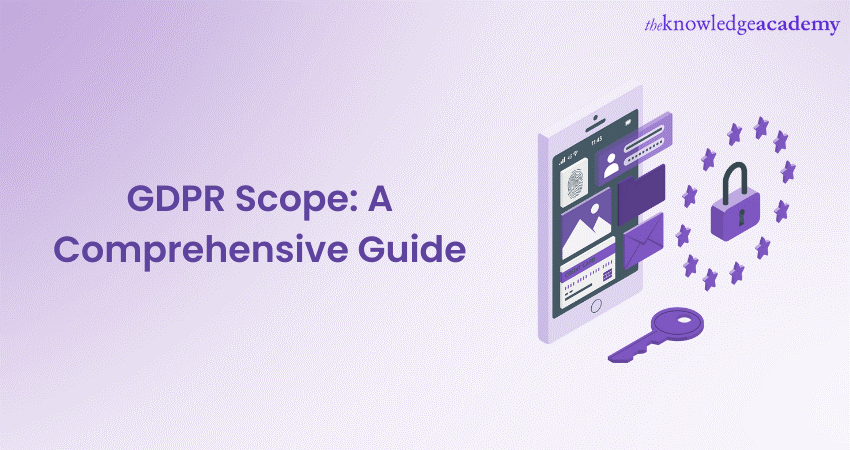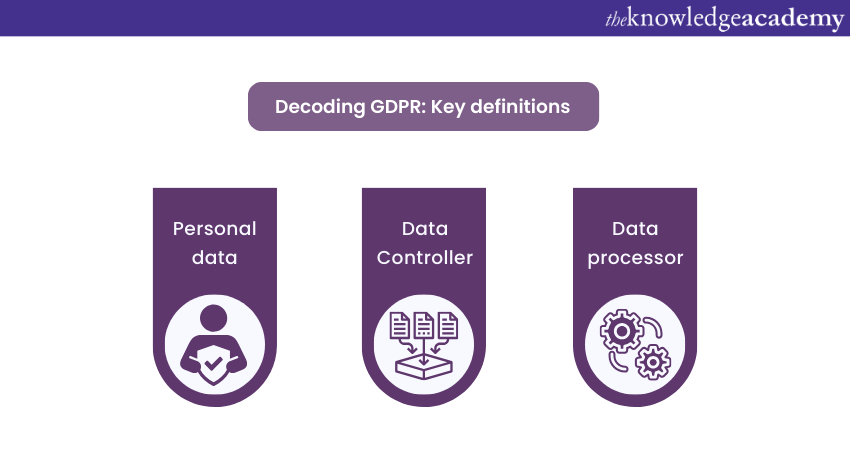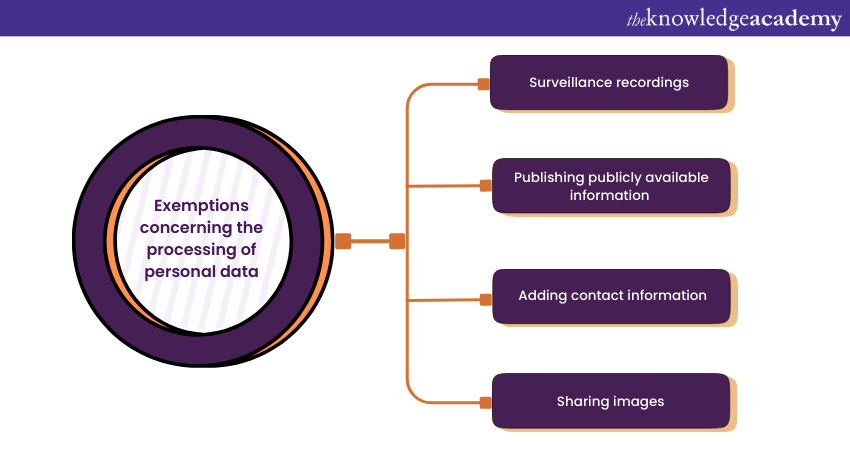We may not have the course you’re looking for. If you enquire or give us a call on 01344203999 and speak to our training experts, we may still be able to help with your training requirements.
Training Outcomes Within Your Budget!
We ensure quality, budget-alignment, and timely delivery by our expert instructors.

The General Data Protection Regulation (GDPR) has transformed the digital landscape, making understanding the GDPR Scope essential for businesses and consumers. This blog will explore the various facets and implications of GDPR Scope for individuals and businesses. By providing you with essential knowledge, we'll explore why is gdpr important and its impact on safeguarding digital privacy.
Delving into the GDPR Scope is not just about compliance but also about fostering trust and safeguarding individual rights in the digital era. TThis blog will help you stay informed what is a gdpr breach with the GDPR Scope by dissecting its provisions, analysing the exemptions, and highlighting best practices.
Table of Contents
1) Understanding GDPR in detail
2) Decoding GDPR: Key definitions
3) What is the scope of GDPR?
4) Personal data processing
5) Exemptions concerning processing of personal data
6) Exemptions in the case of freedom of information and expression
7) Conclusion
Understanding GDPR in detail
The General Data Protection Regulation, or GDPR, is a comprehensive Data Protection Law introduced by the European Union (EU) to protect EU citizens' personal data. Organisations must adhere to their rules and obligations, making regular GDPR Audits crucial for ensuring transparency, consent, and individual rights. It enhances data privacy practices and promotes accountability. As a result, benefits of GDPR empowers individuals to have control over their personal information and increasing trust in the digital ecosystem.
Further, we will discuss GDPR with regard to two key aspects:
History of GDPR
The General Data Protection Regulation (GDPR) has a brief but impactful history. It was adopted by the EU on April 14, 2016, and was enforced on May 25, 2018. However, its development began long before that. GDPR replaced the outdated Data Protection Directive of 1995. It was designed to address the Challenges of GDPR posed by rapid technological advancements and the increasing digitalisation of personal data.
This entails that businesses around the world may be subject to GDPR Requirements if they offer goods or services to residents in EU or monitor their behaviour. The geographical scope of GDPR ensures that the protection of personal data extends beyond EU borders, promoting a consistent level of privacy rights and safeguarding individuals regardless of their location.

Geographical applicability of GDPR
Geographical applicability is a crucial aspect of the GDPR. The regulation has a broad reach and applies to organisations located within and outside the EU, possessing the personal data of EU citizens.
This entails that businesses worldwide are subjected to comply with GDPR requirements if they offer goods or services to EU residents or monitor their behaviour. The geographical Scope of GDPR ensures that the protection of personal data extends beyond EU borders, promoting a consistent level of privacy rights and safeguarding individuals regardless of their location.
Decoding GDPR: Key definitions you need to know
Here are some key definitions you must know to gain a better understanding of GDPR:

1) Personal data: Personal data refers to any information that relates to an identified or identifiable individual. It includes various types of data, such as names, addresses, email addresses, IP addresses, and more. Under GDPR, personal data is protected, and organisations must handle it responsibly and lawfully.
2) Data Controller: A Data Controller is a person that determines the purposes and means of processing personal data. They are responsible for complying with GDPR and ensuring that personal data is processed in a transparent, lawful, and secure manner. Data Controllers have obligations and legal responsibilities under the regulation.
3) Data Processor: A Data Processor is a person who processes personal data on behalf of the Data Controller. They handle personal data based on the instructions provided by the Data Controller and are contractually obligated to protect the data and ensure its security. They have specific responsibilities under GDPR, such as implementing appropriate technical and organisational measures in order to safeguard personal data.
Master data protection compliance with our Certified EU General Data Protection Regulation (EU GDPR) Foundation Course and safeguard your business's future.
What is the scope of GDPR?
Personal data includes sensitive information like name, address, and phone number. So, it should be treated with caution, as any leakage of this sensitive information could cause devastating consequences. That’s where GDPR comes in, and it is mainly for personal data processing with automation. However, in some cases, it’s also applicable for manual data processing.
The GPDR is applicable within the EU zone, but there are some exceptions where it can be applicable outside of it as well. Let’s say your organisation is outside the EU zone but collects the personal data of EU citizens. Then, your organisation should adhere to the GDPR guidelines. So, it doesn’t matter what processes are involved and who carries out the activities of collecting personal data, the GPDR is still applicable.
From small businesses and large corporations to private individuals, the GDPR and Data Protection Act apply to all of them. However, exceptions are applicable in some cases, for instance, if the process of collecting this information is exercised under their rights, like the freedom of information and expression acts.
Personal data processing
Any information that can be used to identify a person is personal information. They can be used to identify a person on their own, or they can be used in combination with others. Now, typical information like name, phone number, address, etc., is personal information. However, they are not the only things that come under personal data. Other information, like images, voice recordings, videos etc, can also be considered personal information.
Moreover, data such as your IP addresses and your browsing history also come under that. So, if this information is stored, read and modified in any way, then the GDPR is applicable. It is also applicable even if these data are processed manually.
In some cases, even if the personal data you are processing is not part of the EU zone but has some sort of connection with it, it will also come under the GDPR. So, even if the data processing doesn’t happen inside the EU, the GDPR is still applicable.
Let’s say the data you are processing is outside the EU. However, the Data Controller has a facilities operating inside the EU, performing certain operations related to processing personal data, it has to adhere to GDPR guidelines.
Other than that, if your organisation is involved in the process of processing data along with monitoring it, it should also adhere to the General Data Protection Regulation.
Elevate your data protection expertise with our Certified EU GDPR Practitioner Course and ensure GDPR Compliance for your organisation.
Exemptions concerning the processing of personal data by natural persons
In some cases, the GDPR is not applicable if the data processing is done by natural persons of interest as a private activity. Here, natural persons refer to human beings or data subjects whose personal data is being processed. GDPR aims to protect their personal data, however there is an exception to it. Let’s take a look at some examples of when these exemptions are applicable:

a) Surveillance recordings: The GDPR exemptions come into play when individuals use cameras or video recording devices to monitor and secure their personal property. For instance, if you install a security camera at your home to monitor your property for safety reasons, this is generally considered a private activity. The GDPR recognises that such personal security measures shouldn't be subject to the full scope of the regulation.
b) Publishing publicly available information: GDPR exemptions also apply when individuals publish information that is already publicly available. This includes data like your name, address, and other contact information that can be readily found in public directories or listings. Since this data is already in the public domain, the GDPR does not impose additional requirements for its processing by natural persons.
c) Adding contact information: When a natural person maintains an address book or contact list for personal use, such as storing names, phone numbers, and email addresses of friends and acquaintances, the GDPR exemptions come into effect. This is considered a private and non-commercial activity that doesn't require compliance with the GDPR's strict rules.
d) Sharing images: GDPR exemptions also cover situations where individuals take photos or images for private use and share them on social media platforms with a limited audience, typically a few individuals. In such cases, the data processing is considered a personal, non-commercial activity, and the GDPR's stringent requirements do not apply.
Exemptions in the case of freedom of information and expression
The GDPR is a legal framework created to protect the privacy and personal data of individuals. However, it also recognises the importance of balancing these rights with other fundamental values, such as freedom of information and freedom of expression. In order to strike this balance, the GDPR includes exemptions and provisions that apply in specific situations to safeguard these important rights. Here's an overview of the exemptions of GDPR in the context of freedom of information and freedom of expression:
Journalistic and academic purposes
GDPR has a specific provision called Article 85. It provides exemptions specifically designed to protect freedom of expression and freedom of the press. It states that EU member states may adopt specific rules to reach a middle ground. It means they can merge the right to the protection of personal data with the right to freedom of expression, including processing for journalistic, academic, artistic, or literary purposes. These rules can allow for derogations from certain GDPR provisions, but they must be proportionate and respect the essence of both rights.
This exemption allows journalists, researchers, artists, and authors to continue their work without any restrictions while respecting the privacy of others. It emphasises the importance of responsible journalism and creative expression.
Public interest
Under Article 6 of the GDPR, the processing of personal data is lawful when it is necessary for the performance of a task carried out in the public interest. This exemption allows public authorities to process personal data when it serves a legitimate public interest, such as public health, national security, or law enforcement.
Similarly, Article 9 permits the processing of special categories of personal data (sensitive data) for reasons of substantial public interest, such as for health and social care, without the need for explicit consent.
These provisions ensure that government agencies and public bodies can carry out their essential functions while complying with GDPR principles.
Freedom of information legislation
GDPR acknowledges that the regulation should not hinder the right to access public documents based on freedom of information laws at the EU or member state level. This recognition aligns with the principles of transparency and access to government information.
Freedom of Information Laws may provide mechanisms to request access to public documents that may contain personal data. The GDPR respects these laws and allows for the disclosure of such documents when it is in the public interest.
Overall, the GDPR recognises the importance of balancing privacy rights with freedom of information and freedom of expression. It includes provisions and exemptions that enable these fundamental rights. These provisions ensure that privacy is protected without unduly hindering essential freedoms.
Conclusion
Understanding GDPR Scope is crucial in safeguarding personal data and upholding individuals' privacy rights. Organisations must understand its scope and requirements to ensure compliance, enhance data protection practices, and build customer trust. Moreover, staying updated with GDPR is essential in today's data-driven world to maintain privacy and meet legal obligations.
Understand data protection and how to implement EU GDPR-compliant programs by signing up for GDPR Training now!
Frequently Asked Questions
Upcoming IT Security & Data Protection Resources Batches & Dates
Date
 Certified EU General Data Protection Regulation (EU GDPR) Foundation and Practitioner
Certified EU General Data Protection Regulation (EU GDPR) Foundation and Practitioner
Tue 7th May 2024
Sat 25th May 2024, Sun 26th May 2024
Mon 8th Jul 2024
Sat 14th Sep 2024, Sun 15th Sep 2024
Mon 23rd Sep 2024
Mon 18th Nov 2024
Sat 7th Dec 2024, Sun 8th Dec 2024







 Top Rated Course
Top Rated Course


 If you wish to make any changes to your course, please
If you wish to make any changes to your course, please


